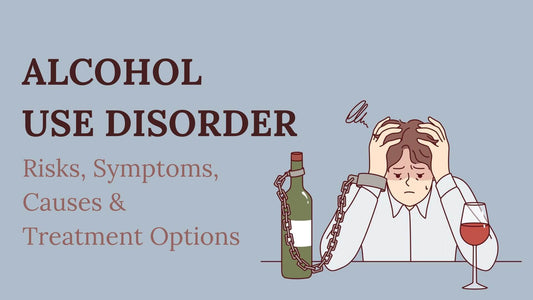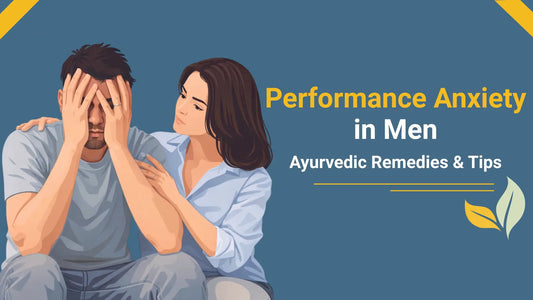
Alcohol Use Disorder: Risks, Symptoms, Causes & Treatment Options
The gap between occasionally indulging in alcohol and becoming overly dependent on it is very narrow. Alcohol Use Disorder, most of us undermine the seriousness of it - A person may not even realize when his or her habitual indulgence turns into serious alcohol dependence and abuse.
What Is Alcohol Use Disorder (AUD)?
Alcohol use disorder is a condition where a person becomes so dependent on alcohol that they have a persistent urge to drink despite its severe negative impact on all important aspects of life- mental health, physical health, social life, finances, and relationships.
Symptoms of AUD
- Strong craving for alcohol.
- Willingly indulge in alcohol overdose.
- Repeated failed attempts to cut back on alcohol consumption.
- Indulging in drinking alcohol even though it severely affects your relationships with friends and family.
- Experiencing hangovers and blackouts.
- Experiencing severe withdrawal symptoms: nausea, shaking, anxiety, insomnia, etc.
Stages of AUD
Early stage
Early stage of Alcohol use disorder occurs when drinking alcohol is not even a problem. At this stage, a person unconsciously decides to indulge in drinking alcohol to unwind, have fun, and relax. As a result, it may progress to a more addictive form of drinking, leading to a cycle of binge drinking in the future.
Middle stage
During this phase, a person becomes more adaptable to drinking, they downplay the severity of the side effects drinking has on their body. Drinking becomes a regular thing - its negative impact becomes visible:
- Stomach bloating
- Visible redness
- Sweating
- Shaking
- Fatigue
Last stage
A person may experience severe withdrawal symptoms if they go even a single day without drinking alcohol. Despite the repeated requests from family and friends to stop drinking or tone down drinking, one starts to prioritize it. As a result, they neglect other activities in their lives - office work, social life, and relationships with family and friends, resulting in mental and physical health problems.
Causes and Risk Factors
Alcohol addiction is like a slow poison - What starts as a means to provide temporary satisfaction and happiness, may end up becoming a source of serious physical and mental health issues. Not all occasional drinking habits turn into the alcoholism stage, some people do have good self-control. Still one cannot deny the fact that the addictive nature of alcohol has destroyed several people’s lives - there is a reason why our country has several De-Addiction centers.
Alcohol use disorder can be the result of several causes. Prolonged drinking leads to your brain relying on alcohol for the production of certain chemicals and can result in serious conditions like Alcoholic Hepatitis and Fatty Liver. This answers “Why is it difficult for habitual drinkers to quit alcohol?” and “Why do they show such strong withdrawal symptoms which at times can be very violent?”
Several other causes are:
Genetic Factors
According to research genetic factors do play an important role to a certain extent. Some people are naturally able to limit the amount of alcohol they consume. On the contrary, others feel more urge to drink alcohol, this is due to the pleasure they experience by taking alcohol.
Psychological Factors
Sometimes, psychological factors push people on the verge of alcohol addiction. People struggling with mental health may often resort to maladaptive coping techniques.
Several mental health disorders like depression, anxiety disorders, PTSD disorder, etc. make a person experience the following symptoms:
- Feeling of distress
- Anxiousness
- Feeling of deep sadness
- Feeling of helplessness / worthlessness
- Intrusive / Uncontrollable thoughts
- Loss of interest in activities or persons
To deal with such a whirlwind of emotions people resort to alcohol drinking so they can break away from the vicious cycle for a short duration of time and find peace. Completely turning a blind eye to the fact that a brief satisfaction - leads to heightened dependency as tolerance increases with time.
Social and Environmental Factors
Our surrounding environment and the people who form part of our social group play a huge role in influencing us when it comes to alcohol:
- Influence on children when they grow up surrounded by family members who abuse alcohol or use it as a coping mechanism, especially if it's a parent.
- The influence of friends who are heavy drinkers.
- Being part of a culture where drinking forms a huge part of social life. The media and culture have promoted and glorified drinking, making it seem a “cool act” to engage in or something one has to do to “fit in” with the crowd.
Health Risks Associated with AUD
There are both short-term and long-term risks associated with alcohol use disorder, initially, they might not be obvious or easy to detect; however, over time, they continue to weaken your body.
|
Short-Term Health Risks |
Long-Term Health Risks |
|
|
Diagnosing Alcohol Use Disorder
There is no specific test designed for the diagnosis of AUD - though there are a series of routes through which a medical practitioner.
|
Screening Tools and Questionnaires |
Laboratory Test Evaluations |
Self-Assessment and Awareness |
For example:
|
Example of laboratory tests:
|
One can also diagnose symptoms of Alcohol use disorder through self-assessment and awareness. However, one should always go to a medical professional for an official diagnosis. Following ways one can self-assess and diagnose AUD symptoms:
The DSM-5 method measures the severity of symptoms - depending on how many symptoms one experiences:
|
Treatment Options for AUD
Treatment option for AUD varies depending on severity. The crucial fact here one has to keep in mind is that patients become very dependent on alcohol both physically and mentally - It’s an addiction.
Along with medication therapies are equally important as patients struggle with immense withdrawal symptoms which at times are not easy to handle and need the help of medical intervention - through medication and therapy. Only a licensed medical practitioner can prescribe you medication for AUD (Avoid taking the medication without consulting a doctor).
Try Addiction Killer for Alcohol Addiction Recovery
Medications
The following medicines are FDA-approved for AUD:
|
|
|
|
Benefits
|
Benefits
|
Benefits
|
|
Side effects
|
Side effects
|
Side effects
|
Cognitive Behavioral Therapy
This therapy follows an approach based on the principle that one’s thoughts, feelings, and behaviors can all influence one another. It helps in aiding to limit or completely stop consuming alcohol - by influencing patterns of thoughts and behavior action - which can encourage alcohol consumption.
Contingency Management (CM)
Contingency Management: This approach is also known as the Carrot And Stick Method / Motivational incentives, it encourages positive behavior change among patients who struggle with AUD. The approach follows the idea that each time a patient achieves a treatment goal they are rewarded - this is done based on objective evidence of behavior change.
For Example - Rewarding a patient if he or she shows the result of a negative drinking test (as the goal was to achieve abstinence.
As discussed previously, one of the causes of Alcohol use disorder can be psychological issues - Depression, PTSD, etc., that’s why it's important to take therapy to address these underlying issues. This will also help in the treatment of AUD.
Apart from consulting doctors, and taking prescribed treatment, which may include a combination of both medications and therapies - one should also focus on eating a nutritious balanced diet along with setting aside time regularly to practice several holistic exercises such as Yoga asanas, meditation, mindfulness, stress management, boosting immunity and strategies to improve digestion. These exercises help in aligning your thoughts, breaking free from the constant cycle of anxiety and nervousness, and at the same time help you better connect with your surrounding environment therapy promoting self awareness, peace, and calmness.
Support Groups and Programs
Engage in a Mutual Support Group - schedule meetings with people who want to overcome their alcohol addiction problem, develop healthier habits, improve sleep quality, and lead better lives. Group therapies led by therapists may help patients not feel lonely during their recovery journey, providing an opportunity to know you are not the only one struggling and learn from other people’s experiences – the kind, empathetic words of other members work as both, comfort and encouragement.
There are several types of support groups - If one group works for your friend it doesn't necessarily mean it will work for you too, so you have to be careful in understanding what kind of group you want, what are your expectations, and which one will support you best in your recovery journey.
Example:
- Alcoholics Anonymous (AA) - uses a 12 steps program, to achieve the goal of abstaining people from drinking alcohol.
- SMART Recovery - focuses on a more science based method approach to abstain people from alcohol use.
Impact of AUD on Families and Relationships
Alcohol use disorder not only ruins said person who struggles with it but also has a major impact on the immediate family. Addiction alters the way a person thinks, feels, behaves, and overall cognitive abilities. It not only affects one's brain and behavior but also makes the said person hollow inside.
It has an impact on a person's social relationships, marital life, and career. Intoxicated people tend to make poor life choices and this could ultimately lead to financial ruin. Many road accidents are a cause of alcohol abuse. It can have serious effects on the children of such people and the child, in turn, may have higher rates of psychological problems like anxiety, phobia, substance- related disorder.
The need to spend money on drugs is more profound and hence the person may end up doing unethical tasks. These people can pursue violence and cause great damage to life and property - addiction becomes so out of hand at times that the patient forgets that the one on the receiving end of their abuse or violence can be their friends and family.
The journey of recovery is long and oftentimes full of relapse episodes - managing relapses and preventing relapse is an important part of the treatment journey otherwise all the hard work so far will go to waste. The following points may be proven effective in minimizing the risk of relapse:
- One should be aware of their triggers and identify their trigger points. Ask the following question to oneself “What encourages you to consume alcohol” or "What are you feeling emotionally, and physically during that phase”.
- Stay active, stay connected, be it with family, friends, or counselors, or join group therapy or any fun activity you like. This will help in keeping you motivated and focused on recovery.
- Take good care of your body, eat a healthy well-balanced diet Sleep at least for 7 hours, take a break, and make yourself feel good by developing a healthy coping mechanism.
- Avoid certain people and places - which you very well know might encourage you to consume alcohol.
Common Myths and Misconceptions
- People who are good at ‘holding their liquor’ - are at less risk of AUD.
- AUD - is not serious in comparison to other forms of addictions.
- Recovering from AUD - only depends on will alone
- Occasional drinkers may not develop AUD.
Conclusion
The road to recovery from AUD is slow and filled with hurdles - withdrawal symptoms and relapses. To be successful, one must be persistent and consistent - do not be afraid to ask for assistance and reach out to others. Dealing with addiction alone can be tiring, and most of the time patients give up on the recovery journey easily with only a few setbacks - during this time, connect and reach out for help. Don't be afraid of stigma or judgment because regaining control and leading a healthy life is more important than anything else.

Dr. Hindika Bhagat
Dr. Hindika is a well-known Ayurvedacharya who has been serving people for more than 7 years. She is a General physician with a BAMS degree, who focuses on controlling addiction, managing stress and immunity issues, lung and liver problems. She works on promoting herbal medicine along with healthy diet and lifestyle modification.




